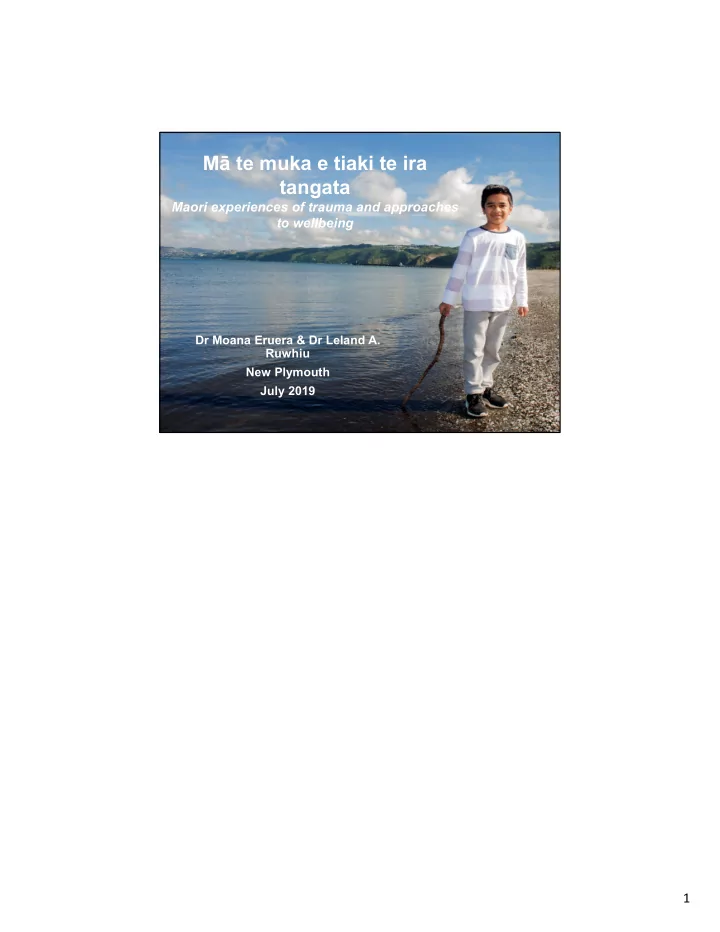

Mā te muka e tiaki te ira tangata Maori experiences of trauma and approaches to wellbeing Dr Moana Eruera & Dr Leland A. Ruwhiu New Plymouth July 2019 1 1
SPOKEN WORD Historical Trauma & Wellbeing 1870-1890 2012-2019 2000-2011 2 This slide demonstrates a timeline of colonisation that broke down Maori social structures, customs and practices which contribute to the causes/impacts of mokopuna. For Maori, trauma is not just about the individual or individual events, it’s about the collective experience and collective impact. Pre‐1840 ‐ I can think Maori, be Maori, act Maori, live Maori and feel Maori 18‐40 to 1860 ‐ War, law and confiscation left me land‐less 1870s to 1890s ‐ Your political system continued to marginalise me leaving me without a voice in our own lands 1900 to 1930s ‐ Your epidemics took our loved ones and your welfare system stole our children from their whakapapa rights 1940s to 1960s ‐ When you strapped my parents for speaking te reo Maori, we their children lost our native tongue 1970s to 1990 ‐ You made me a criminal when we expressed our resistance in peaceful political protest 2000 to 2011 ‐ We are decolonising our minds and souls and are reclaiming our space with places to stand in our own right 2012 to 2019 ‐ No longer do we come to meet you at the Border as an unequal partner …. we assert our sovereignty, we assert and implement our own solutions and practices, as Maori….. Tihei Mauri ora!! 2
2
Te Ao Māori concepts of trauma & wellbeing Maori theory of change – how do we understand violations against mokopuna and move them from a state of kahupo or violation towards a state of ora? Read ngakau reflections – Recognise – reclaim ‐ celebrate 3
Tapu is commonly understood as; Tapu protective, sacredness, restrictions for safety and wellbeing Te tapu o te tangata affirms that all people have personal tapu Te tapu o te tangata is founded in the belief about the sacredness of humanity and underpins how we value and behave with each other Te Tapu o te tangata provides a guide for safety practices and behaviours between people Te tapu o te tangata challenges western notions of abuse, violation and healing. Te tapu o te tangata demands an in- depth understanding of your cultural roots. 4
Mana Mana is commonly understood as power, honour, prestige, authority, self-esteem, humility, level of influence & voice Te mana o te tangata is the cultural adhesive that weaves generations and dimensions to each other Te mana o te tangata prioritises Indigenous notions of growth, development & support Te mana o te tangata can be measured to advance wellness, wellbeing & healing Te mana o te tangata demands an in-depth understanding of cultural wisdom & practice Te mana o te tangata enhances cultural resilience and cultural responsibility Te mana o te tangata challenge the significance of untapped potential 5 5
Whakamana tangata 6 6
Maori theoretical understandings of violence/trauma Dynamics of Whanaungatanga (DOW) “Abuse is a violation of ones tapu. It is a perpetration or an act of violence referred to in Maori as a ‘hara’ which subjects the victim to a state of ‘noa’ or tapu restriction. The concept of noa depicts a person being in the state or absence of mana, that is having no power to effect change… abuse is a violation against the victim, the perpetrator and both of their whanau collectives. The effects of the violation and prolonged state of noa make them vulnerable to further abuse and violent behaviour themselves. The prolonged state of noa is called ‘whakama’… in this sense whakama refers to the symptoms of prolonged unaddressed abuse (an externalisation of the victims hurt emotions and a subconscious plea for help to be cleansed from the violation of their tapu. The manner in which to restore violations of tapu is held within the practice of ‘hohourongo’, hohou (to enter) rongo (peace). Reference: Pa Henare Tate (2002) 7
PLACEHOLDER: GRAINNE MOSS SPEECH Presentation 8 8
Recommend
More recommend